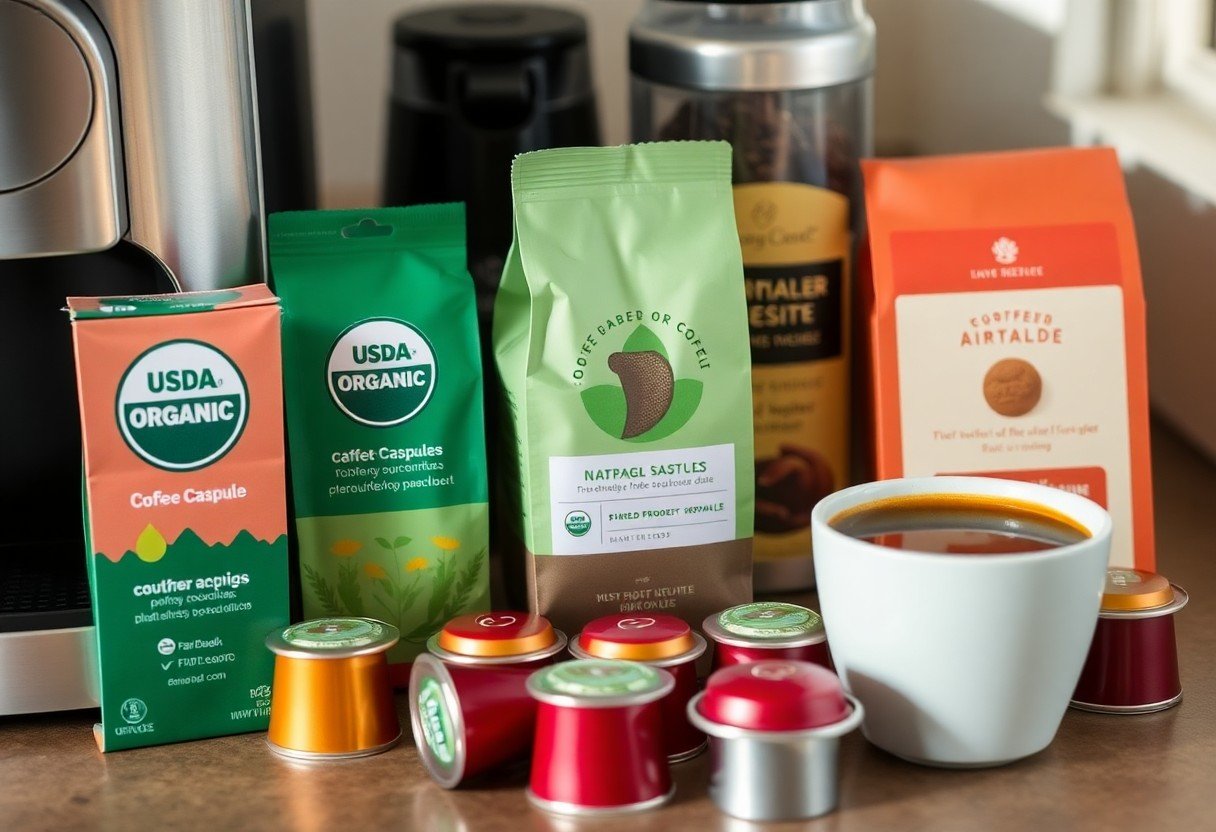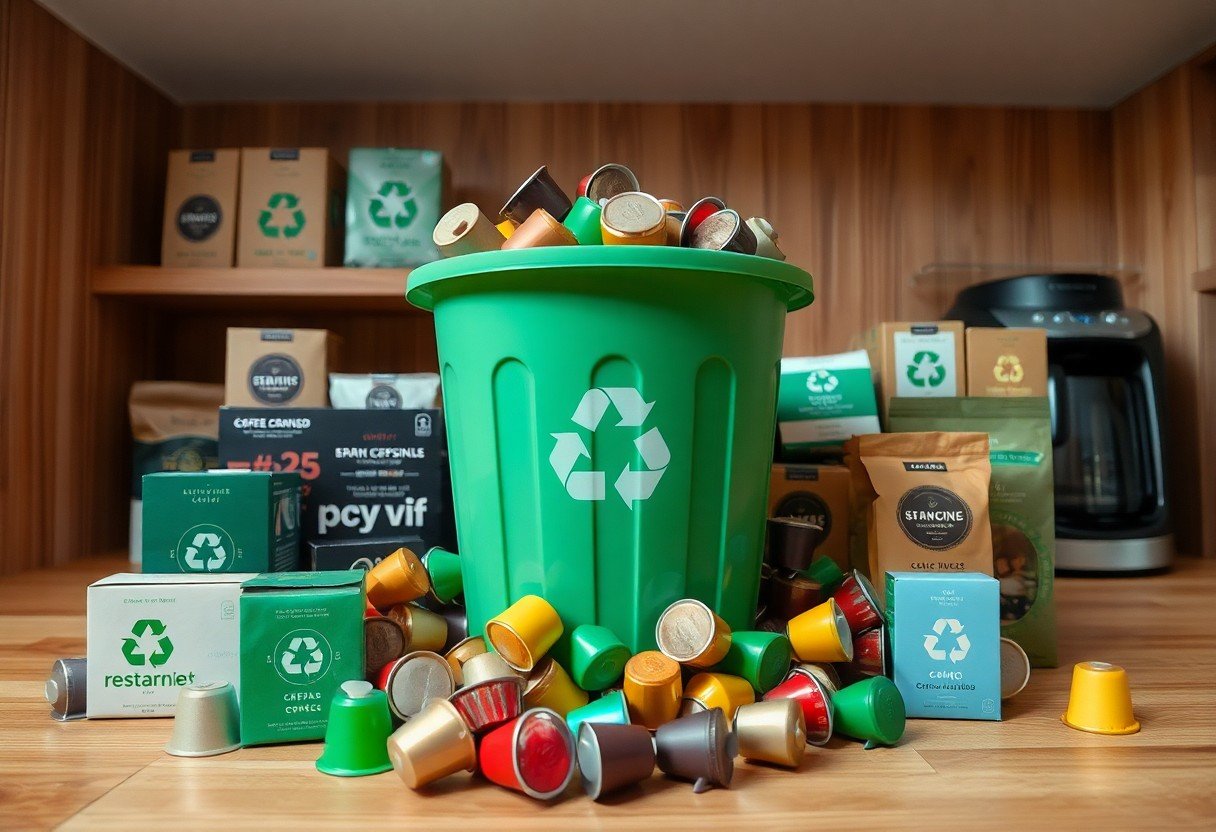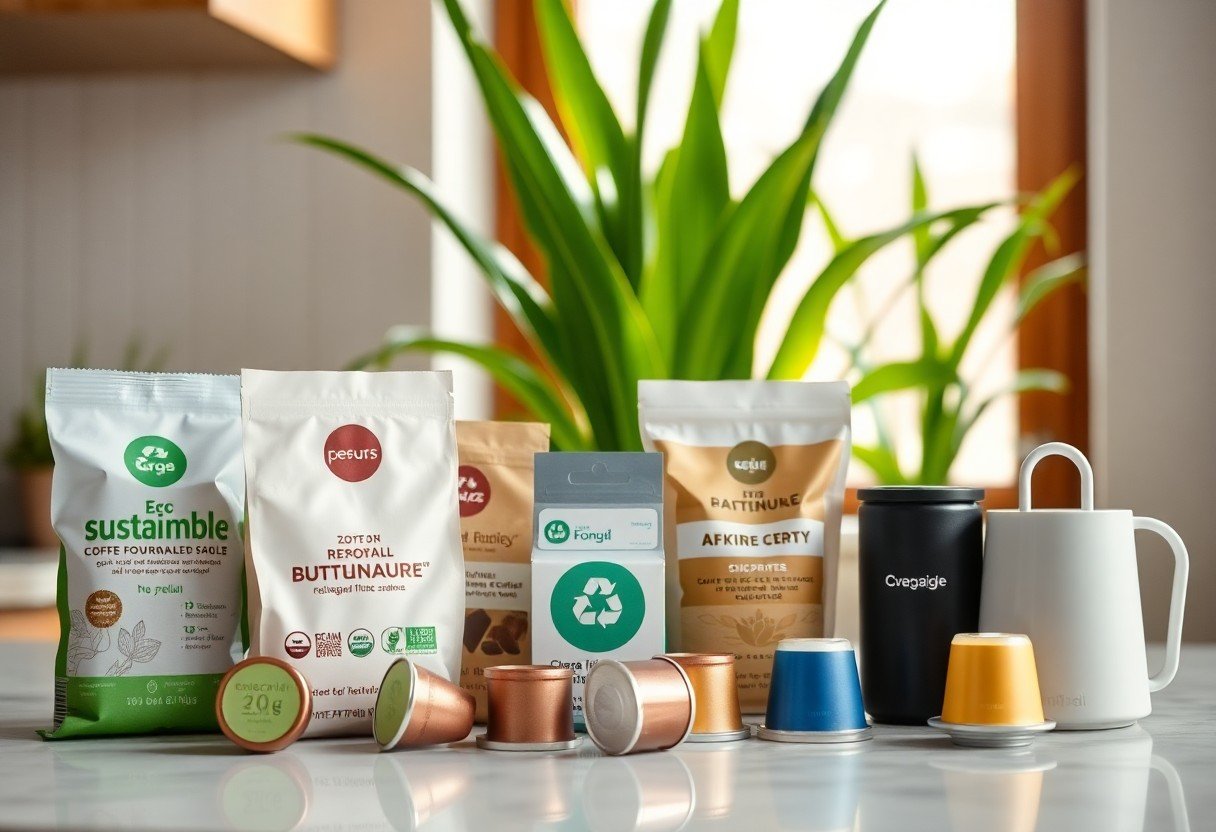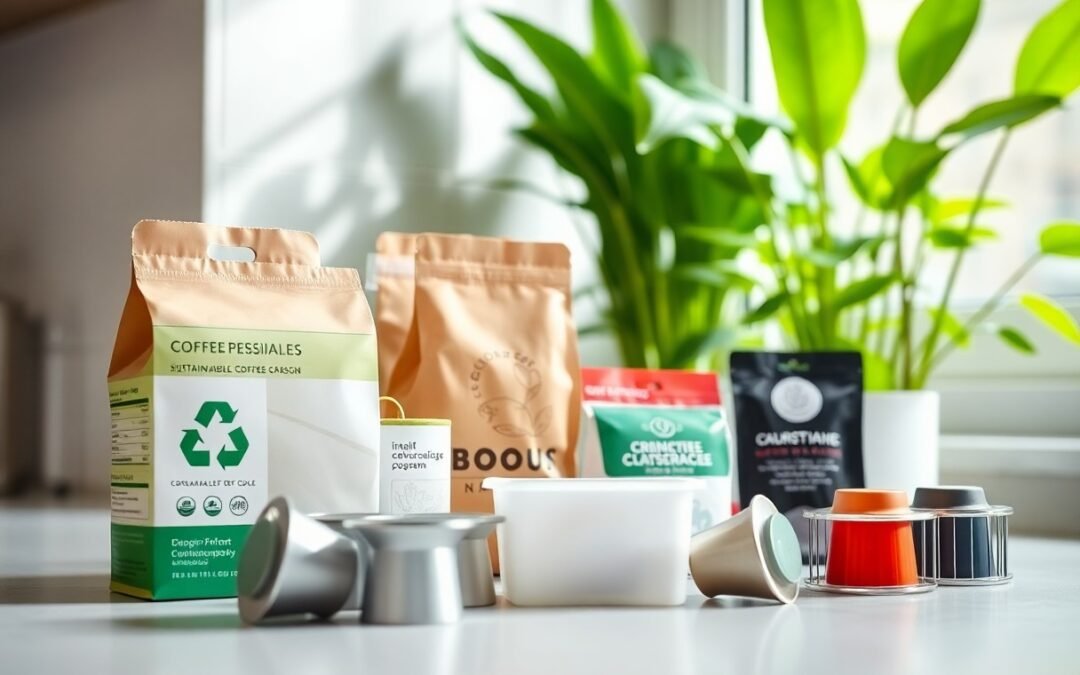There’s a growing demand for eco-friendly coffee solutions, and choosing sustainable coffee capsules can significantly reduce your environmental footprint. In this guide, you’ll learn how to identify the best options that align with your eco-conscious lifestyle, ensuring that your caffeine fix doesn’t come at the cost of the planet. From material types to certifications, you will discover key factors to consider in making informed choices for your daily brew.
Demystifying Coffee Capsule Materials
Understanding the materials that make up coffee capsules is necessary for making environmentally friendly choices. Many capsules are made from a combination of plastics and aluminum, each posing different challenges for sustainability. To navigate this landscape, you need to know the distinctions between biodegradable and recyclable options. For a deeper insight, check out Sustainable Coffee Capsules: From Bean to Eco-Dream.
Comparing Biodegradable vs. Recyclable Capsules
| Biodegradable Capsules | Break down into natural elements over time, often requiring specific composting conditions to degrade effectively. |
| Recyclable Capsules | Must be disposed of in the proper recycling streams to be repurposed, contributing to a circular economy. |
The role of aluminum and plastic in sustainability cannot be overlooked. Aluminum is highly recyclable, with about 75% of aluminum ever produced still in use today, making it an efficient choice. However, the environmental impact of sourcing and processing aluminum can be significant. On the other hand, certain plastics are not universally recyclable, creating challenges for waste management and prompting you to consider the end-of-life outcomes of your choices.
The Role of Aluminum and Plastic in Sustainability
Aluminum and plastic can offer varying degrees of sustainability based on your disposal practices. While aluminum capsules can return to circulation efficiently if recycled properly, many plastic options may not have the same recycling infrastructure available. Understanding the local recycling capabilities can help you make informed decisions about which products to use. Focus on brands that provide clear recycling instructions or offer take-back programs to ensure maximum eco-efficiency.

Navigating Certifications and Labels
Understanding Certifications: Fair Trade, Organic, and Beyond
Fair Trade certification ensures that farmers receive a fair price for their coffee, supporting sustainable farming practices and community development. By choosing Fair Trade coffee capsules, you contribute to better wages and working conditions for growers, particularly in developing countries. Many brands now highlight this certification on their packaging, making it easier for you to identify products that align with ethical sourcing principles. Additionally, organic certifications signify that the coffee was grown without synthetic fertilizers or pesticides, promoting environmental health and reducing harmful agrochemical runoff.
Other certification programs, such as Rainforest Alliance and UTZ, focus on environmental sustainability and social equity. These certifications often address concerns related to biodiversity conservation and ecosystem protection. With rising awareness regarding climate change, products bearing these labels can serve as indicators of environmentally responsible practices. Assessing these credentials allows you to make informed choices that reflect your values as a conscious consumer.
Decoding Eco-Labels on Coffee Capsule Packaging
Eco-labels can often be confusing, especially when different logos and claims appear on coffee capsule packaging. Some brands may use terms like “biodegradable” or “compostable,” but the standards governing these terms vary significantly. A packaging labeled as biodegradable may not disintegrate in traditional landfills, while compostable products might need specific conditions to break down effectively. Always check for third-party certifications that provide credibility to these claims, such as BPI certification for industrial composting or ASTM D6400 for compostability. Understanding these nuances not only helps in waste management but also ensures that your choices contribute positively to the environment.
Look for packaging that explicitly states how products should be disposed of after use. For instance, a capsule designed for home composting usually comes with clear instructions, indicating the right conditions for decomposition and how long it typically takes. Familiarizing yourself with these specifics enhances your eco-friendly practices, ensuring you fully embrace sustainable consumption in your coffee habits.

The Impact of Sourcing Practices
How Origin Affects Sustainability: A Deep Dive
Your coffee’s origin significantly influences its sustainability. Regions that prioritize environmentally-friendly farming practices, such as shade-grown coffee from the highlands, contribute to healthier ecosystems. For instance, coffee grown in these conditions supports biodiversity by providing habitats for various species. Moreover, sourcing from countries with strong regulatory frameworks, like Colombia or Ethiopia, often ensures more ethical labor practices and improved economic conditions for growers.
The Importance of Local and Seasonal Coffee Options

Evaluating Brand Commitments to Sustainability
Scrutinizing Corporate Social Responsibility (CSR) Initiatives
When assessing a brand’s commitment to sustainability, plunging into their Corporate Social Responsibility (CSR) initiatives provides valuable insights. Brands that genuinely prioritize sustainability often publish detailed reports outlining their environmental impact, social contributions, and ethical sourcing practices. For example, substantial investments in community development or educational programs for farmers demonstrate that a company is committed to more than just profit. Look for brands that not only set ambitious sustainability goals but also share their progress transparently, revealing deadlines and achievements.
Consider how brands address issues like climate change, fair labor practices, and community engagement. Companies such as Nespresso have launched significant programs to offset their carbon footprint and support farmers through direct trade practices. Assess the depth and authenticity of the company’s CSR efforts, distinguishing between superficial marketing campaigns and genuine commitments that drive long-term change.
Assessing Transparency and Supply Chain Integrity
Transparency in a brand’s supply chain can reveal a lot about their sustainability practices. Companies that openly share information about where and how they source their coffee are likely to have more ethical and eco-friendly practices. Seek brands that provide traceability from farm to cup, showcasing partnerships with farmers and cooperatives. Initiatives like Starbucks’ Coffee and Farmer Equity (C.A.F.E.) Practices aim for transparency and ensure coffee is sourced sustainably, benefiting both farmers and the environment.
Understanding the integrity of a supply chain goes beyond just sourcing practices. It involves analyzing how a brand supports its growers, including fair compensation and eco-friendly farming techniques. Brands that prioritize direct trade relationships often facilitate better profits for farmers and promote organic farming practices, reducing harmful pesticide use. This focus not only benefits communities but also enhances the overall sustainability of coffee farming.
Assessing Transparency and Supply Chain Integrity
Digging deeper into the supply chain will expose whether a brand actively minimizes environmental impact and fosters ethical labor practices. Look for detailed communication regarding sourcing locations, farmers involved, and certifications upheld throughout the production process. Transparency isn’t merely about sharing information; it reflects a brand’s accountability and commitment to sustainable practices. Engaging with brands that provide comprehensive insight into their sourcing journeys empowers you to make informed decisions aligned with your values.
Making Eco-Conscious Choices in Your Daily Brew
Your coffee routine can align with eco-friendly principles by making informed choices at each step. Selecting sustainable coffee capsules is just the starting point. Explore options that use fully compostable or recyclable materials, which not only reduce landfill waste but also contribute positively to the environment. Brands that implement transparent sourcing and ethical practices enhance your overall experience while ensuring your daily brew is responsible. Check for reputable certifications like Fair Trade or Rainforest Alliance, as these indicators can guide you toward quality products that prioritize sustainability.
Practical Tips for Selecting and Using Sustainable Capsules
Choosing the right sustainable coffee capsules involves careful consideration and a few practical steps. Start by looking for capsules made from biodegradable materials such as organic plastics or aluminum, which can be recycled. Identify brands that offer refillable options, allowing you to use your desired coffee without generating single-use waste. Also, pay attention to the flavor and strength of the coffee; seek out dark roasts or blends that might better complement the inherent flavors of sustainable beans.
- Check for certifications indicating ethical sourcing.
- Research brands that provide comprehensive recycling programs.
- Consider investing in a reusable capsule system for versatility.
- Experiment with local coffee options to reduce carbon footprint.
Creative strategies to minimize waste can significantly enhance your eco-friendly lifestyle. Engaging with local coffee shops not only supports small businesses but often provides custom grinding services, enabling you to bring your own container. Also, switching to a manual brewing method, like a French press or pour-over, reduces reliance on capsules altogether. Explore ideas such as using coffee grounds in gardening or as natural exfoliants, making the most of each brew while cutting down on waste. Every small effort contributes to a larger movement towards sustainability.
Creative Ways to Reduce Waste Beyond Capsules
Think beyond capsules to make a bigger environmental impact in your coffee habits. You might consider composting used coffee grounds, which enriches garden soil and reduces landfill waste. Many urban farms welcome coffee grounds for their nutrient-rich properties. Another option is repurposing spent coffee grounds in DIY beauty treatments, such as scrubs or masks, which reduce overall product packaging waste. Seeking out local roasters and direct trade options not only supports ethical sourcing but also cuts down on transportation emissions, promoting a sustainable lifestyle further.
Final Words
Ultimately, choosing sustainable coffee capsule options requires a thoughtful approach to your consumption habits. By prioritizing biodegradable, compostable, or recyclable capsules, you can significantly reduce your environmental footprint without sacrificing your coffee experience. Look for brands that are transparent about their sourcing and manufacturing processes, emphasizing sustainable practices that align with your values. Additionally, considering alternatives such as reusable capsules allows you to enjoy your favorite brews while minimizing waste.
As you make decisions about your coffee consumption, it’s beneficial to explore local options that may offer sustainable choices tailored to your community. Engaging with local roasters not only supports local economies but also provides you with a deeper connection to the coffee you enjoy. By being proactive in selecting eco-friendly coffee options, you take meaningful steps toward a more sustainable lifestyle that benefits both you and the planet.
FAQ
Q: What should I look for when choosing sustainable coffee capsules?
A: Look for certifications such as Fair Trade, Rainforest Alliance, or organic labels. Opt for capsules made from biodegradable or compostable materials, and consider brands that use responsibly sourced coffee.
Q: Are there brands that prioritize sustainability in their coffee capsules?
A: Yes, brands like Nespresso’s sustainability line, Illy, and Biocafe offer options designed with eco-friendly practices. Research their sourcing and production processes to ensure they align with your values.
Q: How do biodegradable coffee capsules differ from traditional ones?
A: Biodegradable coffee capsules break down naturally in a composting environment, while traditional plastic capsules can take hundreds of years to decompose. Biodegradable options reduce landfill waste.
Q: Can I recycle coffee capsules, and if so, how?
A: Many manufacturers provide recycling programs for their capsules. Check the specific brand’s guidelines for recycling, and ensure you separate the coffee grounds from the capsule before recycling.
Q: What impact does choosing sustainable coffee capsules have on the environment?
A: Choosing sustainable coffee capsules helps reduce plastic waste, supports ethical farming practices, and decreases the carbon footprint associated with coffee production. It promotes a cleaner and healthier ecosystem.

